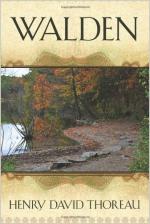|
This section contains 648 words (approx. 2 pages at 400 words per page) |

|
Unity
According to Thoreau's transcendentalist philosophy, nature, humanity, and God are unified. His transcendent God is also immanentpresent in every raindrop, blade of grass, and animal as well as in every human being. Further, one of the best ways for human beings to experience their own unity with God is to observe nature. In the woods one day, he writes:
I was suddenly sensible of such sweet and beneficent society in Nature, in the very pattering of the drops, and in every sound and sight around my house, an infinite and unaccountable friendliness all at once like an atmosphere sustaining me.
Explaining why he loves the company of nature, Thoreau writes, "Am I not partly leaves and vegetable mould myself?" This theme of unity occurs throughout the book, often through metaphors, similes, and personifications that equate nature, humans and the divine. "I may be either the driftwood in...
|
This section contains 648 words (approx. 2 pages at 400 words per page) |

|




